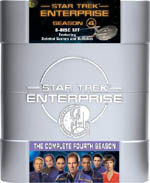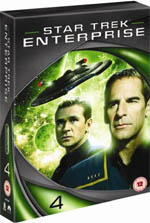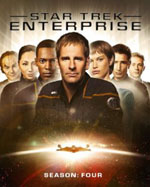98: These Are the Voyages...
And here we are at the last television Star Trek story to date. Show creators Rick Berman
and Brannon Braga turn in their only script for the fourth season, and prove that they have become
completely out of touch with what makes a Star Trek narrative exciting or relevant. It's not hard
to believe that they were simply burnt out, since both had been capable of some very high quality
work in the past, and perhaps would be again after taking a rest from Trek.
For the most part, the various scenes in this episode are tasteful and pleasant,
enjoying a relaxed pace with which to explore characters, chiefly the characters of
the main cast of "Enterprise". Viewing this story was a much more agreeable experience
than I had remembered.
The chief problem here is that it seems to just ramble on and on without a clear purpose,
while we trust that the purpose will inevitably be revealed as events unfold. All the pleasant
character scenes gently point towards one particular sequence near the end, depending on it
for some kind of aim or focus. And when we get that sequence, it is both very poorly thought out
in itself, and has next to no relevance to anything else that came before.
The entire tale is framed from the point of view of William Riker and Deanna Troi in the
24th century. Somehow, my memory had been telling me that they had settled in on their new
ship by this time after the events of
the tenth feature film "Nemesis".... which probably would
have been a better idea. But for reasons that escape me, we see them instead in the midst of the
events of the seventh season TNG episode "The Pegasus". Not so good.
There is a certain amount of extra audience draw in bringing back these two characters
from a popular previous incarnation of Star Trek (along with a voiceover of Data). It certainly
is a more interesting and believable frame of reference than Daniels could ever provide. But it
still seems to be here out of bad habit on Berman and Braga's part, as though they have trouble
staying focused on the present moment, and enjoy getting lost in future and past when it really
doesn't serve their story.
Supposedly, Riker is pouring over the events of an old NX-01 mission because he needs help
making his big decision of the episode "The Pegasus". For "Enterprise" fans who haven't seen
that TNG episode, about half of the mystery of "The Pegasus" is revealed
in "These Are the Voyages...." here as a pointless SPOILER.
Shame on you, B. & B.! Worse, the events and character motivations and choices made
by the NX-01 characters really have no resemblance to what Riker is going through, so it's a
particularly bad match, and it's all very difficult to see what, if anything, Riker is gaining
through this exercise. We go through it trusting that such relevance is forthcoming,
but in the aftermath, when you think about it, it makes no sense.
A bizarre side-effect of this framing device is that we end up getting lots of
establishing shots of NCC1701-D, the version of Enterprise that featured in "The Next Generation",
which we really didn't need since we're not trying to follow the plot of "The Pegasus".
Meanwhile, shots of this show's Enterprise, the NX-01, are nowhere to be found,
making it harder to follow the story we should be investing in. Ay caramba! Additionally,
we get the date from Riker's log 47xxx.x indicating seventh season TNG, but we don't get
a date from Archer's log, which is several magnitudes more important.
Curiously the events for the NX-01 are not in their fourth year as the rest of the 4th
season has been. We've jumped from 2155 last seen in "Terra Prime", and have now advanced
to their tenth year 2161. (Remember, when playing the "Federation Day" variation of poker,
two's, aces and sixes are wild.) I don't mind this jump forward in time so much, as it instinctively
made more sense to me to only cover important historical events on Enterprise, and I got tired of
the slow-moving fluff that irrelevant episodes inevitably contained when trying to fit
26 adventures into every year on board any given starship - which was more of a stretch
with the slower moving ships of this time.
Still, the primary reason for the main story being set in 2161 here is to witness
the formation of the Federation, but disappointingly the story is not about that, and only
related to that in the vaguest possible way. The only plot strand with a significant conflict
is supplied by Shran. Nice to see him again, but this isn't one of his better outings.
Very little imagination or care went into the plotting of the weird little ransom/rescue
action plot, which is full of opportunities for all sides to have done smarter things.
Blech.
The framing device also gets in the way here. A lot of Braga's time travel problems
crop up for entirely different reasons. Each time Riker embeds himself into the action,
or has a conversation with someone from NX-01, we know we're looking at something that
didn't actually happen in 2161, but instead some bizarre variation extrapolated by
Enterprise-D's holodeck program. So just how accurate are the portions that Riker doesn't
interfere with, the ones in "objective mode"? We know they didn't employ holodeck recorders
on actual NX-01 decks in 2161, so what are we and Riker watching?
Additionally, some of this just gets downright creepy and distracting. Archer and T'Pol
have a good conversation at one point, but as the camera pulls back to reveal Riker in the same
room eavesdropping on them, unnoticed, it's unnerving and jolts one out of one's suspension
of disbelief. It's as though a loud member of the audience has wandered onto the stage during a play,
and you know he's going to interrupt the proceedings and hijack our attention for his own
selfish agenda.
Something tells me that this device might have made a weird, half-decent crossover
episode when allowed to disappear into the middle of an insignificant season. But here,
where it seems it must somehow embody and celebrate the very essence of Star Trek,
it really is out of place.
And that brings us to the pivotal action sequence that all other scenes point to.
There are times when screenwriters make a mistake and shoot the artistic fortunes of their
piece in the foot. This finale seems like it has taken that idea another step too far
and shot itself in the head. Whatever possessed them to think that killing off Trip
was a good idea? Death has a way of making everyone examine the event and everything that
led up to it with a keener eye, looking for alternate choices that might have led to a better outcome.
The action scene resulting in Trip's death can't begin to stand up to any such scrutiny.
In action terms, it's ludicrous. How did the villains' ship catch up to Enterprise without
them noticing? (Bizarre that exterior opticals were turned off today...) If Reed is
"larger than life" according to Riker's history, where is his security force? Why is
the lead villain content to play along with the string of stupid suggestions Trip makes
in front of him? Why can neither Trip nor Archer come up with a better solution?
Everything that plays out here is artificial to the extreme.
Emotionally, it doesn't satisfy any sense of sending Enterprise off on a worthy note,
nor does it connect to the decision Riker has to make, nor does it make any real sense
for Trip's character, or his relationship with T'Pol or any of the rest of the crew.
It doesn't say anything about what they achieved in exploring space for 10 years
which couldn't be said equally well by having Trip remain alive. The sacrifice was in
no way relevant to any achievement, which is a common fault of many dramas in general,
but by making the action so clumsy and nonsensical, that point is further reinforced
in this story.
And of course, it's not as if "Enterprise" stories will continue into another season
without Trip / Connor Trinneer. Here at the end, the meaningless death is merely
pointless.
In the end, it feels like Trip's death here is merely a publicity stunt to try
to draw additional viewers in to watch.... which is like a corporate variation
of playing with matches or firearms just to get attention. Dangerous behaviour
that should garner anything from scolding by parents to serious jail time.
In actual fact, B.& B. may have actually decreased their audience
for this episode on original broadcast instead, if some internet sources are accurate.
But I'll give this story a point or two for many of the sad sentiments throughout
leading up to the expected mothballing of NX-01 and the end of an apparent 10-year mission,
which culminates in a worthy final few minutes as characters from two different time periods
appreciate the monumental ceremonial moment of the Federation's creation, as three different
versions of Enterprise sail off into their respective "sunsets" with their captains
uttering Roddenberry's famous opening narration.
This story may have been a bit of a stinker,
but its closing shots still dredge up considerable amounts of nostalgia and goodwill.
And whatever the faults of the Berman era of Star Trek, that era did produce the longest
and most successful run the franchise had ever seen, bringing us 25 seasons and 4 movies
across a stretch of 18 years. And the stories had mostly been quite respectful of
Roddenberry's key philosophies and values. Bizarrely, all that was about to change.....
Read the next Star Trek In-depth Analysis Review:
"Star Trek 11" - the J.J. Abrams movie
| 







 slimline
slimline



